We use information collected through cookies and similar technologies to improve your experience on our site, analyze how you use it and for marketing purposes.
Your privacy settings
We and our partners use information collected through cookies and similar technologies to improve your experience on our site, analyze how you use it and for marketing purposes. Because we respect your right to privacy, you can choose not to allow some types of cookies. However, blocking some types of cookies may impact your experience of the site and the services we are able to offer. In some cases, data obtained from cookies is shared with third parties for analytics or marketing reasons. You can exercise your right to opt-out of that sharing at any time by disabling cookies.
Manage Consent Preferences
Necessary
Always ON
These cookies and scripts are necessary for the website to function and cannot be switched off. They are usually only set in response to actions made by you which amount to a request for services, such as setting your privacy preferences, logging in or filling in forms. You can set your browser to block oralert you about these cookies, but some parts of the site will not then work. These cookies do not store any personally identifiable information.
Analytics
These cookies and scripts allow us to count visits and traffic sources, so we can measure and improve the performance of our site. They help us know which pages are the most and least popular and see how visitors move around the site. All information these cookies collect is aggregated and therefore anonymous. If you do not allow these cookies and scripts, we will not know when you have visited our site.
Embedded Videos
These cookies and scripts may be set through our site by external video hosting services likeYouTube or Vimeo. They may be used to deliver video content on our website. It's possible for the video provider to build a profile of your interests and show you relevant adverts on this or other websites. They do not directly store personal information, but are based on uniquely identifying your browser and internet device. If you do not allow these cookies or scripts it is possible that embedded video will not function as expected.
Google Fonts
Google Fonts is a font embedding service library. Google Fonts are stored on Google's CDN. The Google Fonts API is designed to limit the collection, storage, and use of end-user data to only what is needed to serve fonts efficiently. Use of Google Fonts API is unauthenticated. No cookies are sent by website visitors to the Google Fonts API. Requests to the Google Fonts API are made to resource-specific domains, such as fonts.googleapis.com or fonts.gstatic.com. This means your font requests are separate from and don't contain any credentials you send to google.com while using other Google services that are authenticated, such as Gmail.
Marketing
These cookies and scripts may be set through our site by our advertising partners. They may be used by those companies to build a profile of your interests and show you relevant adverts on other sites. They do not store directly personal information, but are based on uniquely identifying your browser and internet device. If you do not allow these cookies and scripts, you will experience less targeted advertising.
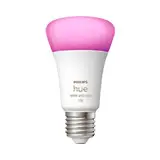
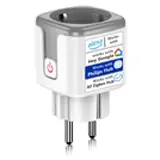
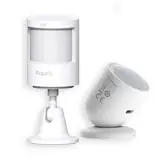
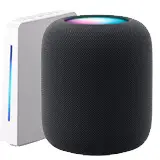
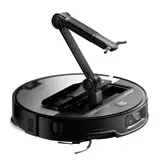

Home Assistant vs Alexa vs Google Home: Which one to choose?
Is your home ready to jump into the world of artificial intelligence? Controlling your lights with your voice, turning up the heat before you get home, or even scheduling your garden watering are just some of the wonders that home automation puts at our fingertips. But, which ecosystem should you start with? The choice between Home Assistant, Alexa, and Google Home can be overwhelming. Don't worry, we'll guide you to make the best decision based on your needs and experience level.
Understanding Your Options: Home Assistant, Alexa, and Google Home
Before we dive into comparisons, it's crucial to understand what each platform offers. Each has its strengths, weaknesses, and a different approach.
What are Alexa and Google Home?
Alexa (via Amazon Echo devices) and Google Home (now Google Nest) are smart virtual assistants. They're designed to make your life easier with voice commands, music playback, news, information, and, most importantly, controlling smart devices. They're easy to set up and use, making them the perfect choice for beginners.
The main advantage of Alexa and Google Home lies in their simplicity and broad device support. Integrating smart bulbs, plugs, or thermostats is, in most cases, a quick and simple process.
What is Home Assistant?
Home Assistant is an open-source home automation platform. Unlike Alexa and Google Home, Home Assistant focuses on customization, privacy, and complete control over your smart devices. Requires more technical know-how for initial setup, but offers unparalleled flexibility.
Home Assistant offers a level of control and customization that Alexa and Google Home simply can't match. You can create complex automations, integrate devices not compatible with the most popular voice assistants, and keep your data private.
Detailed Comparison: Alexa vs Google Home vs Home Assistant
To help you choose the best option, we'll analyze each platform based on several key criteria.
Ease of Use
Alexa and Google Home: They're masters of simplicity. Initial setup is quick, the interfaces are intuitive, and voice control is smooth. If you're looking for a plug-and-play experience, this is your best bet.
Home Assistant It requires more effort. The setup can be a bit daunting for less tech-savvy users, and configuring complex automations demands a little programming (though there are plenty of online guides and communities that can help you).
Device Compatibility
Alexa and Google Home: They're both compatible with a huge variety of smart devices. From Philips Hue lightbulbs to Roomba vacuums, through Nest thermostats and Ring security cameras, the compatibility is very broad. Amazon and Google have agreements with numerous manufacturers, ensuring seamless integration.
Home Assistant Compatibility is great, but it needs more work. Home Assistant can control pretty much any smart device, even those that aren't officially compatible with Alexa or Google Home. However, this may require installing custom components or modifying the configuration.
Privacy
Alexa and Google Home: Privacy is a constant concern. Both assistants collect data about your interactions, raising questions about how that data is used. While you can adjust privacy settings, such as deleting voice recordings, data collection is unavoidable.
Home Assistant Privacy is a priority. As an open-source platform, you have complete control over your data. You can install Home Assistant on your own hardware and avoid sending your data to the cloud.
Customization and Automations
Alexa and Google Home: They offer some customization and automation options, but they are limited. You can create simple routines that trigger multiple actions with a single voice command, but complex automations are difficult to implement.
Home Assistant He's the king of customization. You can create complex automations that respond to a wide variety of factors, such as the time of day, the weather, the presence of people at home, or the status of other devices. Flexibility is virtually unlimited.
Price
Alexa and Google Home: The initial investment is low. You can get an Echo Dot or a Google Nest Mini for an affordable price. However, you might need to buy extra compatible devices to fully utilize the smart home features.
Home Assistant The initial cost may be higher, depending on your setup. You'll need hardware to run Home Assistant, like a Raspberry Pi or an old computer. However, in the long run, Home Assistant can be more economical, since it doesn't require subscriptions or cloud services.
Internet connection
Alexa and Google Home: They need a constant internet connection to work. If the connection drops, most features will become unavailable.
Home Assistant It can work locally. Even though an internet connection is needed for some features, like voice control, most automations can still work even if the connection goes down.
Voice Control
Alexa and Google Home: Voice control is one of its strengths. Both assistants can understand a wide variety of commands and respond quickly and accurately.
Home Assistant It requires the integration of a third-party voice assistant. You can integrate Alexa or Google Home with Home Assistant to control your devices with voice commands. You can also use other open-source voice assistants, like Rhasspy.
Comparison Table: Alexa vs Google Home vs Home Assistant
Use Cases: Which is the Best Option for You?
To help you make your final decision, let's consider some common use cases.
Smart Home Beginner
If you're just starting out, Alexa or Google Home are the best options. Their ease of use, broad compatibility, and affordable price make them the perfect entry point into the world of home automation. You can start with a simple smart plug and gradually add more devices to your smart home.
Technical User
If you're tech-savvy and enjoy customization, Home Assistant is the perfect choice. You can create complex automations, integrate unsupported devices, and have complete control over your data. It's a platform that lets you explore the possibilities of home automation to the fullest.
Concerned about Privacy
If privacy is your main concern, Home Assistant is the best choice. You can install it on your own hardware and avoid sending your data to the cloud. Plus, since it's an open-source platform, you can audit the code to make sure no data is collected without your consent.
Home with Multi-Brand Devices
If you have smart devices from different brands, Home Assistant might be your best bet. Even though Alexa and Google Home work with a lot of brands, Home Assistant offers even more compatibility and lets you integrate devices that aren't officially supported by voice assistants.
Limited Budget
If you're on a budget, Alexa or Google Home are the best options to start with. You can get an Echo Dot or Google Nest Mini for a reasonable price. Home Assistant might require a larger upfront investment, depending on the hardware you choose.
Recommendations and Best Practices
Regardless of the platform you choose, here are some tips to get the most out of your smart home.
Integration of Different Ecosystems
You don't have to stick to just one ecosystem. In fact, many users combine different platforms to make the most of their features. For instance, you can use Alexa or Google Home for voice control and Home Assistant for advanced automation.
Example: Alexa/Google Home + Home Assistant
You can integrate Alexa or Google Home with Home Assistant to control your devices with voice. This lets you enjoy the ease of use of voice assistants and the flexibility of Home Assistant. The setup can be a bit complex, but there are many online guides that can help you.
Conclusion: Choose the Perfect Platform for You
The choice between Home Assistant, Alexa, and Google Home depends on your needs, technical skills, and budget. If you're looking for an easy-to-use solution with broad compatibility, Alexa or Google Home are the best choice. If you're looking for customization, privacy, and total control, Home Assistant is the ideal option.
Remember you don't have to stick to just one platform. You can combine different ecosystems to get the most out of their features. The most important thing is that you choose the platform that best suits your needs and allows you to enjoy a smart, comfortable, and secure home.
Now that you have a clear idea of the different options, are you ready to take the plunge into home automation? Share this article with your friends and family who are also interested in automating their homes!
Related Posts
How to connect old appliances to a smart home
Do you have old appliances that you love but feel out of the smart home loop? Don't worry! You don't have to get rid of your retro toaster or your trusty coffee maker to join the automation revolution. Integrating old appliances into your smart home is easier than you think. We'll show you ...
Morning automation: how to wake up with lights and music
Waking up can be a battle. The shrill sound of the alarm jolts you out of a deep sleep, leaving you groggy and grouchy. What if there was a better way? Imagine waking up gradually with soft light and your favorite music. That's the promise of morning automation, and it's at your fingertips.What's ...
Voice assistant or physical button? Comparison of control methods
Remember when controlling a device meant pushing a button? What a time! Now, we have voice assistants that obey us just by hearing our voice. But which is better, the trusty physical button or the futuristic voice assistant? Let's find out. The Battle for Control: Voice Assistants vs. Physical Buttons Technology is advancing ...
TOP 10 most useful voice commands for a smart home
Can you imagine controlling your home with just your voice? A smart home is no longer the stuff of science fiction. It's an accessible reality, and voice commands are the key to unlocking its potential. Stop looking for switches and start talking. Discover the 10 most useful voice commands that will transform your life ...